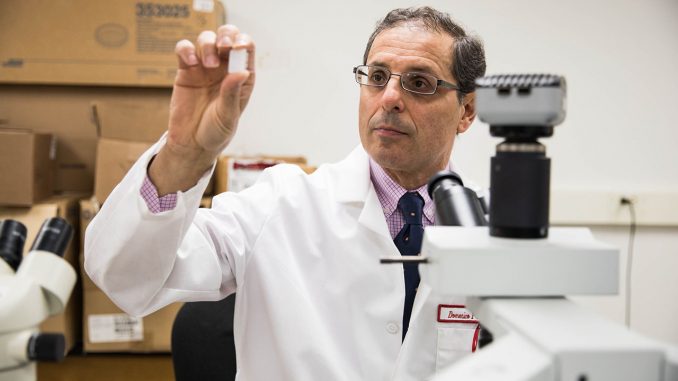
The Lewis Katz School of Medicine created the Alzheimer’s Center at Temple from funds donated by Board of Trustees member Phil Richards earlier this month.
Richards’s gift created the center and established the Scott Richards North Star Charitable Foundation Chair for Alzheimer’s Research. Dr. Domenico Praticò, a pharmacology professor, will be the new chair and director of the center.
The exact amount donated to create the center was not released.
Richards, a 1962 economics alumnus and former student body president, was elected to the Board in 2009. He is the executive chairman and founder of the North Star Resource Group, a financial services firm. The firm provides 10 percent of its profits to the Scotts Richards North Star Charitable Foundation each year.
The charitable organization, which also donated funds to create the center, focuses on funding six causes: research on Alzheimer’s disease, breast cancer, ataxia — a degenerative nervous system disease — cystic fibrosis and myelofibrosis, as well as Bikes for Kids, a nonprofit that donates bicycles to children in need.
Alzheimer’s is the most common form of dementia and is the sixth leading cause of death in the United States. This disease is progressive, meaning it gradually worsens over time and there is currently no cure.
Richards said his foundation was planning to donate the funds to a different institution for Alzheimer’s research, but a call from the Lewis Katz School of Medicine Dean and Temple University Health System CEO Larry Kaiser changed his mind, and he decided to donate to Temple.
Richards’s mother Sara Lipari died from Alzheimer’s when she was 84 years old, he added.
“Everybody been touched by this disease, and we’re not doing enough,” Richards said.
The foundation has committed to funding the chair for five years. Then, a revenue stream will be established to continue funding the center and its research, Richards said.
“It’s a very gratifying feeling that the foundation gift will be around long after I’m gone,” Richards said.
Praticò, who has researched Alzheimer’s disease for more than two decades, said he is honored and humbled to be the founding director of the center.
“It’s a very exciting moment for Temple to have the ability to create the center that specializes in the kind of research efforts for this disease,” Praticò said.
He said he considers this research a “personal fight,” remembering his first encounter with Alzheimer’s disease about 12 years old when his grandfather suffered from it.
“I remember his feeling of frustration when he could not recall names, facts or places, and then things became worsening,” he said. “It was very sad to see a man, that as a young boy, I considered my hero, kind of little by little slipping into this process of withdraw from the rest of the world.”
“There was a moment where he could not recognize me anymore,” he added.
At the time, doctors said the symptoms Praticò’s grandfather experienced were just getting old, but Praticò could not accept this.
“I never, ever agreed with the concept that being old means not being able to have memory,” he said.
In medical school, Praticò regularly encountered patients who suffered from Alzheimer’s disease like his grandfather. This motivated him to dedicate his research to this disease after completing his residencies.
Praticò said the new center is currently researching several topics related to Alzheimer’s disease, like the risk factors for developing the disease later in life.
In more than 95 percent of Alzheimer’s cases, Praticò said doctors do not know how it is caused. However, his research shows children who have a mother who develops it are at a higher risk of also developing the disease than if their father has Alzheimer’s.
“The hypothesis they are working on now is the pregnancy,” Praticò said. “It is something unique to that period.”
A drug therapy for the disease is also being tested on animals right now. Praticò said the center hopes to begin clinical trials with human subjects in less than two years.
The drug aims to “re-energize” a cell process that rids the cell of toxins. The process usually worsens with age.
“The unique ability that makes you human is the ability to remember,” Praticò said. “If you are robbed of that ability, basically your humanity is lost.”
CORRECTION: Dr. Domenico Praticò’s name was misspelled in the previous version of this story.


Be the first to comment